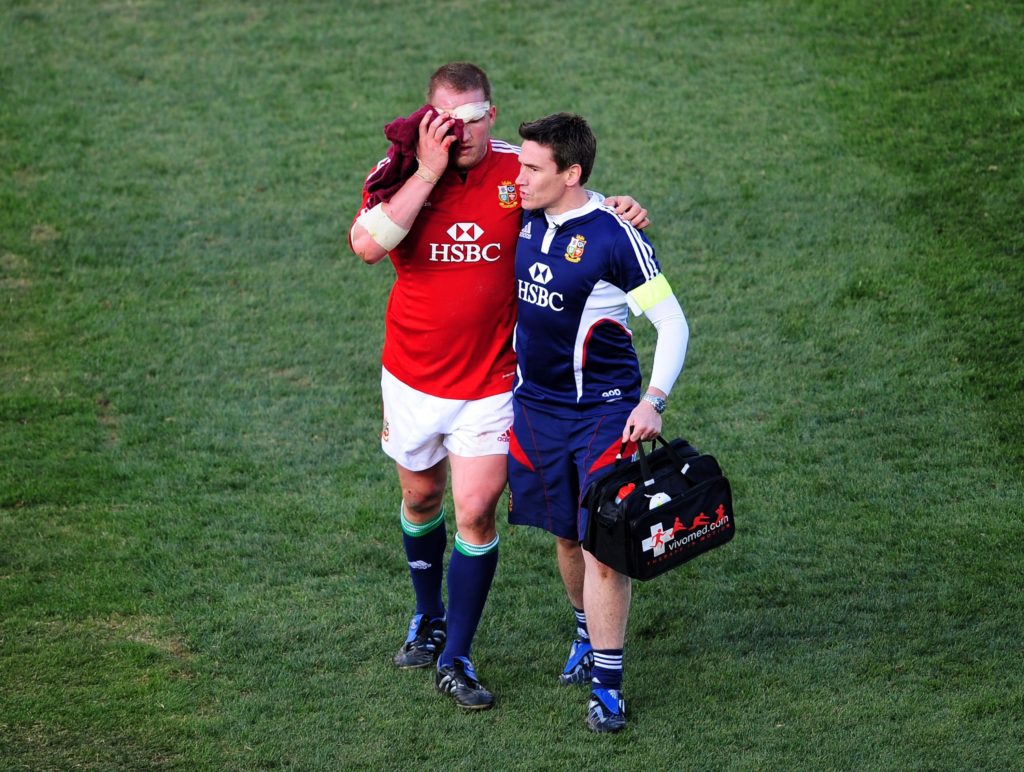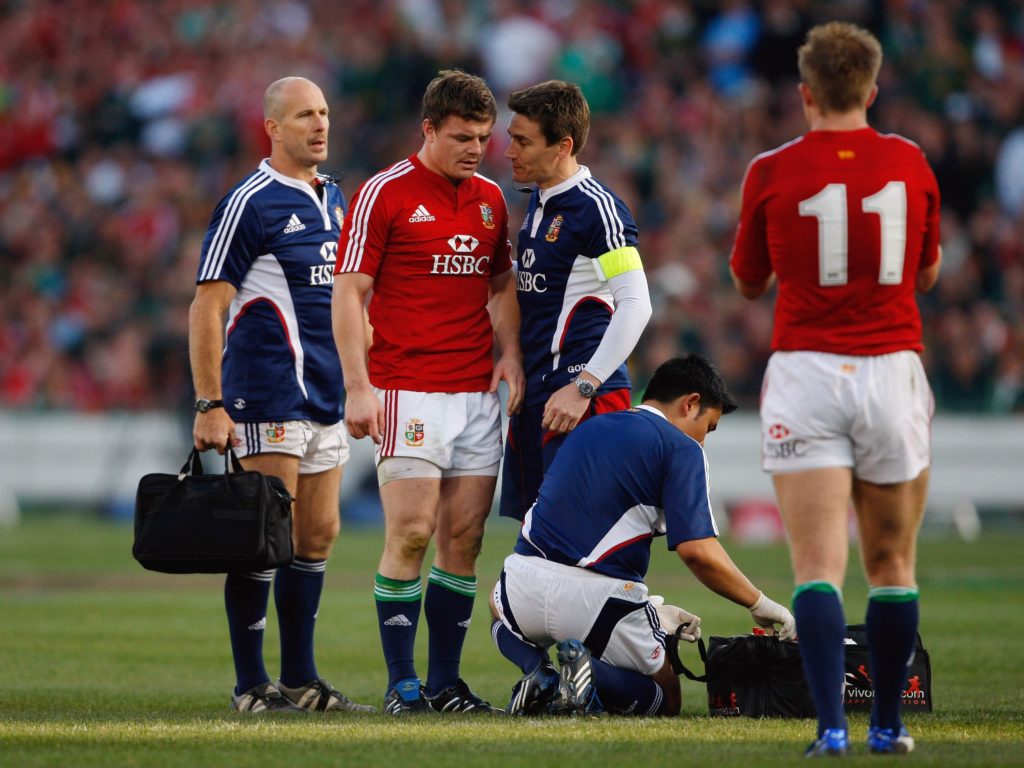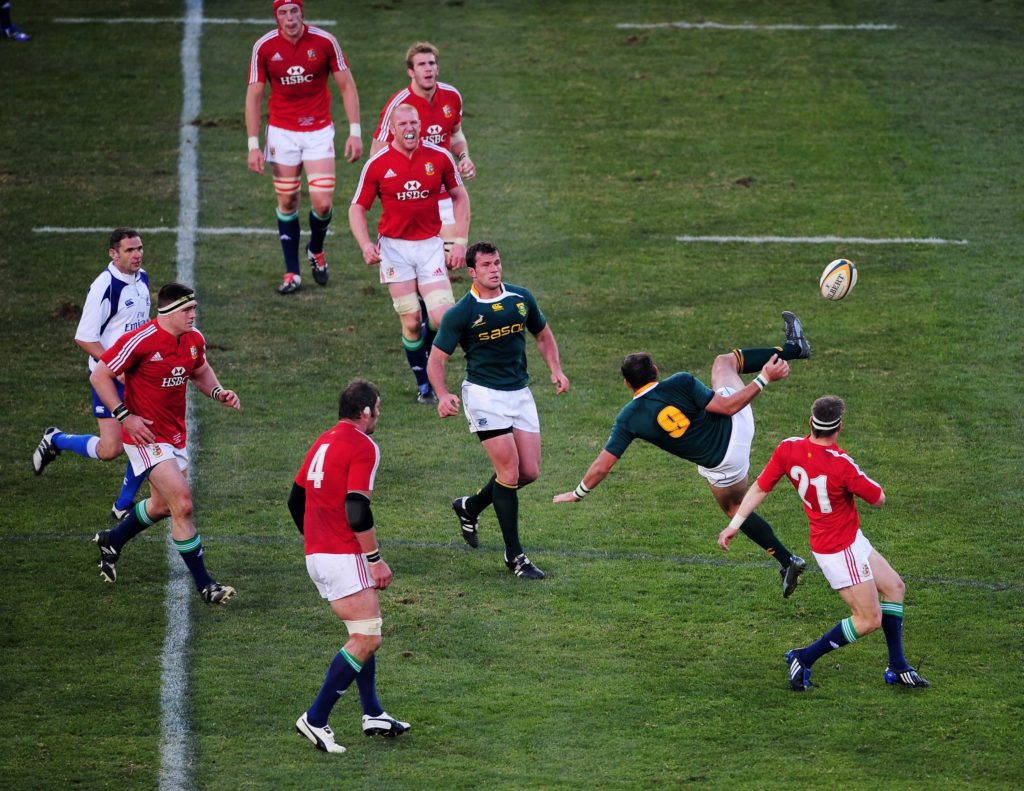It took 21 seconds for the tone to be set for one of the bloodiest games in the history of professional rugby.
When then rookie French referee Christophe Berdos witnessed South Africa flanker Schalk Burger wilfully insert his fingers into the right eyeball of British & Irish Lions winger Luke Fitzgerald’s but chose to only punish him with a yellow card there was no turning back. Blood was going to be spilt. And so it was.
Those of us who witnessed first-hand a game of such brutal ferocity it would change the trajectory of rugby forever will never forget what we saw. With no quarter asked and none given, player after bloodied player was left battered, bruised and broken as the Battle of Pretoria played out in front of front of our eyes. The lasting damage caused to many of those players is only now beginning to be understood.
That Morne Steyn kicked a 55-metre penalty with the last play of the game to win the second Test and secure an insurmountable 2-0 series lead is lost somewhat in the memory of a grotesquely physical game that saw two Lions players – Adam Jones (dislocated shoulder) and Gethin Jenkins (compression fracture of the cheekbone) – rushed to hospital.
A week later, Lions team doctor James Robson held one of the most honest and heartfelt press conferences in the relatively brief history of professional rugby. Fourteen years after players gave up their day jobs to be paid to play, the veteran sports physician argued passionately for urgent change.
“These have been the most physical three Tests I have been involved in,” Robson told us at the end of a tour which saw no fewer than 10 Lions return home injured.

“As a spectator (sic), the games have delivered but I still have anxieties about the number of matches players are subjected to in the northern hemisphere. I hope at some point welfare will become a bigger part of player-management. There is a lot of talk and rhetoric but for the players’ sake I hope more action is taken.
“We are reaching a level where players have gotten (sic) too big for their skill levels. They have become too muscle-bound and too bulky and I think you may see changes in their physical nature in order to speed up the game and introduce a higher level of skill.
“You have to look at the midweek games and the length of the tour, Personally I would like a slightly longer tour with less frequent games. I don’t want to lessen Lions tours but perhaps it should be eight games over eight weeks.”
Ask any player, or indeed journalist, who has dealt with Robson and they will tell you he is a players doctor. Unlike like some who have opted to stay quiet, dumb down or downright deny that professional rugby should come with a health warning, the Scottish medic was prepared to risk his standing in the sport to call it for what it had become. He should forever be applauded for that.
The Lions were far from innocent either. Burger’s borderline criminal act apart, Simon Shaw and Brian O’Driscoll should both have seen red for high tackles which would have seen them handed hefty bans today.
That tour which Robson witnessed closer than most had been the inevitable manifestation of 14 years of unfettered and unchecked professionalism where marketing brutality for profit had become routine while authorities turned a blind eye to routine acts of on-field violence. In poor Fitzgerald’s case, it could have led to literal blinding.
The Lions were far from innocent either. Burger’s borderline criminal act apart, Simon Shaw and Brian O’Driscoll should both have seen red for high tackles which would have seen them handed hefty bans today – in a world where targeting the head is finally being adequately policed – while the Springbok flanker should also have been sent off by the hapless Berdos for a swinging up on Rob Kearney in the second half.

Just a few other incidents in an astonishingly violent game included Lions hooker Matthew Rees almost garrotting Springbok replacement lock Andries Becker in the 47th minute, Andrew Sheridan punching the same player in the testicles 14 minutes later and Jamie Heaslip launching a shoulder to Bryan Habana’s head when he scored a try in the 62nd minute. If you don’t believe me, watch the match back on YouTube. It’s there for all to see.
Each one of those incidents would have been a red card under today’s interpretations of the laws. In those days, some didn’t even warrant a penalty.
“The 2009 Lions tour was the second I’d covered,” said the Sunday Mirror’s chief sports writer Andy Dunn.
“I’d had a taste of it in 2001 when Nathan Grey ended Richard Hill’s tour with an elbow direct to the head in the second Test. I was ghosting Phil Vickery’s column on that series and I remember going to interview him after one Test and he was just so beaten up and knackered. Coming from a footballing background, I’d never seen anything like it.
“What struck me in the build-up to the 2009 series in South Africa was that all the talk was about the 1974 Lions tour and Willie John McBride’s famous ’99 call. It was effectively glorifying violence and the authorities and unions were prepared to be lenient because it was what was expected of a Lions tour. It became self-fulfilling prophecy because the 2009 tour was just brutal.”
The upcoming Lions series in South Africa will not see anything like the levels of violence witnessed 12 years ago. It was unsustainable and the public simply won’t tolerate it anymore.
In many ways this writer could be accused of deploying the same tactic of reporting violence to entertain an audience. But this not an attempt to glorify the violence, rather to serve as a reminder of how far rugby has come in some respects in the intervening years and how far it still has to go in others. “Player welfare is our No1 priority” we are repeatedly told by the authorities. But is it, really?
The upcoming Lions series in South Africa will not see anything like the levels of violence witnessed 12 years ago. It was unsustainable and the public simply won’t tolerate it anymore. With the ongoing legal case against the RFU, World Rugby and the WRU showing no sign of disappearing – an insider at law firm Rylands this week told me “nothing has changed” since the action was launched last December – the conversation around head injuries and its links to dementia has matured sufficiently for only the most diehard of sports medics to continue to deny that repeatedly damaging the brain in your younger years could lead to difficulties later in life.
With the NFL paying out almost $1billion to retired gridiron stars suffering dementia linked to their playing careers in 2011, rugby has had to face up to the very real threat of crippling litigation if it does not take its responsibilities its participants seriously. The work has only just begun.

The memory of Pretoria 2009 is still fresh for some, although not necessarily all its participant players. The game ended with replacement fly-half Ronan O’Gara, on in place of the injured Jamie Roberts, tackling Fourie du Preez in mid-air barely a few minutes after a sickening clash had left the Irishmen clearly concussed and suffering significant facial damage. The utterly needless penalty O’Gara conceded gifted Steyn the opportunity to win the game and the series. The Springbok replacement fly half needed no second invitation.
After the game the criticism of O’Gara was sustained and fierce. No criticism to my memory was made of a system and culture that permitted, nay encouraged, brain-damaged players to stay on the field. Gary O’Driscoll, one of the team medics on that tour and another players doctor with integrity, chose not to tour again in 2013 when invited to do so by Warren Gatland, such was his disgust at the appalling scenes and culture he’d witnessed in 2009.
We can rest assured the upcoming series will not be decided by the confused judgment of a brain-damaged player allowed to play on. The sport has come a very long way on that front and World Rugby and its unions should be applauded for starting the process of cultural change.
But can rugby rest on its laurels? Absolutely not. Remember what James Robson called for in 2009? An eight-game tour in eight weeks. What are the players being asked to do in 2021? Eight games in five weeks. Or nine in six if you include the pre-departure Japan marketing exercise. All at the end of the most challenging and fixture-laden domestic season in history due to Covid.
Player welfare is your No1 priority? Prove it.
More stories from Sam Peters
If you’ve enjoyed this article, please share it with friends or on social media. We rely solely on new subscribers to fund high-quality journalism and appreciate you sharing this so we can continue to grow, produce more quality content and support our writers.



Comments
Join free and tell us what you really think!
Sign up for free